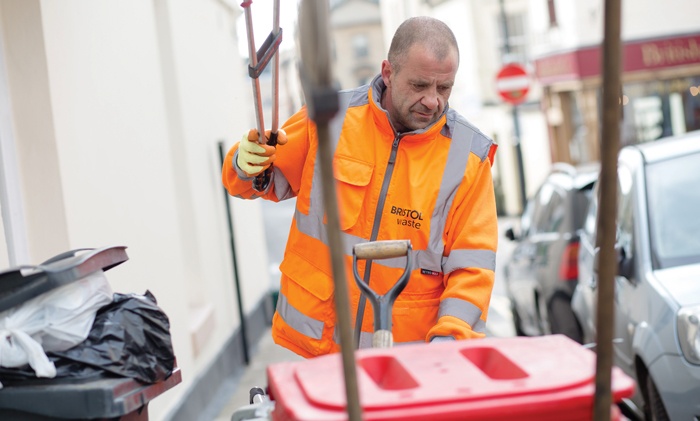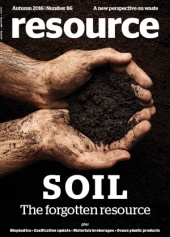Cleaning up the city: the Bristol Waste Company
In setting up the Bristol Waste Company, Bristol City Council is getting its recycling into ship-shape conditions. Leonie Butler navigates the changes

Last June, Bristol City Council announced it had ‘mutually agreed’ with Kier (formerly May Gurney) to end its waste collection and street cleansing contract half way through. Its intention (in what appears to be a growing trend for council recycling) was to bring the services under a council-owned company, in this case the Bristol Waste Company (BWC), to improve recycling rates and reach the targets the council had anticipated for the city.
The handover period saw employees, vehicles, equipment and facilities move across to BWC from Kier, with the new service starting on 1 August 2015. At the time, the council said that it was still looking ‘in full detail at the best long-term service model’, and only expected the new system to be operated for a year.
BWC obviously did something right, though, because on 11 August this year, Bristol City Council’s Cabinet awarded Bristol Waste Company a 10-year contract to provide an integrated service for the city. Finance Director Steve Ostler, who helped set the company up, says it was welcomed by employees: “Even though it had its own challenges, in inheriting a company the new waste company reassured the council that this was viable and offered a better-than-market price.

“Employees are pleased by the contract, as they know where they stand [and] are more engaged with the company. Moreover, we are local and if you’ve got an issue, you don’t have to go to head office – we’re visible to the workforce.”
Announcing the 10-year agreement, Bristol Mayor Marvin Rees said: “One of my key promises to the city has been to launch a Clean Streets Campaign. We need a city-wide strategy to tackling problems with littering and fly-tipping, and to increase recycling rates. We must work closely with community organisations and schools to promote behaviour change.
“We have been given a real opportunity to make a difference to Bristol’s streets, and after considering all the facts, we believe that Bristol Waste Company offer us the best chance to achieve our ambitious goals for the city. There is a lot of work to be done, but we hope that a 10-year contract will allow us the stability to make serious progress towards tidying up our streets.”
To give a little context to how Bristol is currently doing, in 2013/14, Bristol City Council recycled or composted 41.5 per cent of waste, a fall of 3.8 per cent on the previous year. After recycling and composting, the council was left with 221.1 kilogrammes of residual waste per person, according to Resource’s residual waste league table, meaning it ranked 51 out of 138 disposal authorities in England, Wales and Northern Ireland. Ostler hints that the council is already now recycling 47 per cent and believes it can go beyond this, though 70 per cent recycling, although technically feasible, would be a little too ambitious for a large city like Bristol with a great deal of flatted accommodation. “We have an aspirational waste strategy, but don’t think 70 per cent recycling by 2025 will be translated into contract. We have said, however, that we will achieve over 50 per cent by 2020. The key for us is to decouple waste growth with population growth.”

For most of the city’s 189,000 households, the council’s recycling service consists of fortnightly collection of residual waste, combined with weekly collection of recyclables in two separate boxes and food waste in a food waste caddy, as well as a charged garden waste service.
Under the terms of the agreement, BWC will be responsible for the vast majority of Bristol’s waste services: waste collection, street cleansing and winter maintenance; communication, education and customer engagement; household waste and recycling centres; waste treatment and disposal; the sale of recyclable material; and waste and recycling collection from council premises.
BWC has also committed to provide revenue funding to manage, once built, a third household waste, reuse and recycling centre in the city. Responsibility for enforcement for waste offences will continue to lie with the council, which will work closely with BWC to enable successful prosecutions.
For now, residents will see little change in their collection, though Ostler hopes that they’ll have higher “customer satisfaction”. BWC is working on a number of potential changes that it will take to the council next year to decide upon to see an increase in recycling and revenue. “It will probably contain 10 options or so for the council to consider. One of those will definitely involve reducing the frequency of residual collections – whether that be monthly or three-weekly”, explains Ostler.
“The three main issues are: 1. How acceptable/ convenient is it to the residents? 2. How much is it going to cost? 3. What is it going to do for our recycling performance? It is up to the council to decide its balance between cost and acceptability.”
Ostler definitely believes there’s appetite for a reduced residual collection service in the city, but recognises ‘one size doesn’t fit all’: “If you reduce collection frequency or residual bin size, you are likely to encourage more materials into recycling, that’s fairly well documented.

“However, we recognise what will work for one area of the city, might not work for another. We’ve got about 60,000 properties that are not a wheeled bin collection because of the type of housing stock. I think slightly different collection services for different parts might work, though you have to be careful not to dilute cost benefits.”
The company needs to update its collection vehicles in 2018, so the system could dramatically change, if the council sees benefit in doing so, Ostler adds. “Our current source-separated collection produces good- quality material. It is expensive to collect, but you get better revenue downstream from it. However, we get
a lot of messages from people that [source separated] collection and storage has very negative impact on littering the city... But if we went co-mingled, we haven’t got a MRF, so we’d be relying on a third party and a big injection of investment for new, wheeled- bin containers.”
Meanwhile, with four new community engagement officers, specialising in talking to students, schools and businesses, BWC is hoping that these individuals will go into and rally communities to engage with recycling.
 This article was taken from Issue 86
This article was taken from Issue 86The company is also currently running the mayor’s Clean Street campaign, a ‘behaviour nudge’ request for people to take responsibility for their waste, as well as a specific campaign in the Stapleton Road area of the city to address fly-tipping of small and bulky waste and abuse of commercial waste containers. “We’re trying to say to communities: ‘You must be fed up with this – so are we, so let’s try and do something about it.’ That might come back on us to do more, put more bins out or sweep streets more frequently... The bulky waste collections, however, and to charge or not, is the council’s policy, but BWC believes they might have some influence to better understand whether there’s a correlation between charging for bulky waste and fly-tipping and what we do at the household waste recycling centres.”
At the moment, a wide variety of collectors pick up the city’s commercial waste, but BWC is starting a commercial waste arm from next April. “The reason we want to do commercial waste is that hopefully we can make a surplus we can bring back into the council’s funds, and it might allow us to make an offer to smaller businesses in Bristol that aren’t well served by other contractors. It will also allow us to have more control over the street scene generally. There’s always a temptation to just keep on clearing it up, but that doesn’t encourage the right behaviour. But, if we want people to recycle more and have more pride in their area, we need to do that from a position of strength and bite the bullet and make it clean.” 







